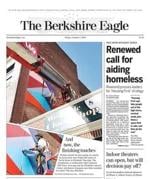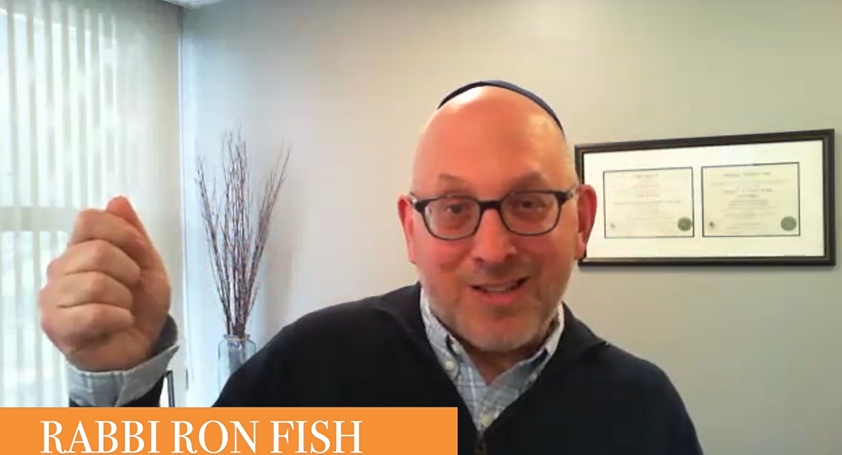For the latest Eagle Reels vodcast, host Dalton Delan interviews Rabbi Ron Fish, the interim regional director the Anti-Defamation League’s New England Regional Office, based in Boston.
The ADL was founded in 1913 to “to stop the defamation of the Jewish people and to secure justice and fair treatment to all.” ADL’s New England Regional Office serves Massachusetts, Maine, New Hampshire, Rhode Island and Vermont.
This Q&A is from the interview and has been edited for length and clarity. The full interview can be viewed in its entirety at berkshireeagle.com.
Dalton Delan: With the Anti-Defamation League’s decades-long tracking of antisemitic incidents (See: ADL's Hate, Extremism, Antisemitism, Terrorism Map), in 2022, the last year for which I have seen numbers, there were 152 incidents in Massachusetts, which was twice [what the number] two years before that. What accounts for this?
Rabbi Fish: The numbers have been staggering. There has been a rise over the last decade that is really without precedent since we've begun studying these numbers in 1979. In the United States, things have turned in a dark direction and dramatically. The reality is that political leaders matter: When people open the door to extremism and hate, when people articulate an openness to working with the kinds of extremists who engage in hateful rhetoric, against Jews, against members of the LGBTQ+ community, against Black Americans, against others — that speech has real-world implications. What they've done is they've given a greenlight to extremists here in the Commonwealth and around the country to engage in more and more dangerous activity.
Delan: It’s confusing, anti-Zionism and antisemitism. Are we allowed to have problems with (Israel Prime Minister Benjamin) Netanyahu or the prosecution of the war in Gaza? Where does that move into antisemitism?
Fish: It's certainly not antisemitic to challenge Israeli policy or take issue with Israeli actions. It's not antisemitic to oppose any political leader of any kind. Certainly, Bibi Netanyahu, who is probably the most unpopular politician in Israel right now. Opposing him is not an antisemitic act.
What we've seen is not simply taking issue with Israeli policy. What we've seen is an outright claim that Jews, and Jews alone, do not have the right to collective sovereignty anywhere in the world. The notion of Zionism has been so demonized, that in many quarters the word “Zionism” is seen as a synonym for white supremacy, or for a form of hate itself, which is difficult even to process. Zionism is the radical idea that Jews are people who have the same rights and the same responsibilities as other people. Jewish Zionist dreams, the idea of being a sovereign in our historic homeland, can be entirely consonant with the belief in Palestinian rights and Palestinian nationalism. Those can live side by side. We have to take seriously the idea that we have to respect the legitimacy of all communities.
Delan: It isn't just campuses (See: ADL's Center for Antisemitism Research's report "Campus Antisemitism: A Study of Campus Climate Before and After the Hamas Terrorist Attacks"). In neighboring Connecticut, Fairfield County, a friend of mine has had a terrible experience recently with the junior high school there, with severe antisemitism. How much is the ADL seeing this in public schools, not just university campuses?
Fish: Undoubtedly, what we're seeing does express itself in middle schools and high schools across the country. This is not just a phenomenon of the margins of our societies, this is now happening in good school systems, and it's happening across the board. The danger is that people feel as though they are fighting this fight alone. It requires a coalition of decent people, people who are themselves targets in other instances, to come together and fight on behalf of everyone who is targeted.
And that's why we build coalitions with the LGBTQ+ community, with Black leaders and with the Hispanic community. And even with the Muslim community; it's difficult right now. But we believe that this can't be solved alone. The problem of anti-Black racism is not for Black people to solve. It's for the entirety of society. And the problem of antisemitism is not a Jewish problem. It is a problem of our society to address.
Delan: With all we've talked about here, let me give you a last word on what gives you hope.
Fish: I understand why people would assume it's sort of hard to muster some kind of hope with all the things that seem to be going wrong. But let's take a breath. The world has plenty of troubles, the world has plenty of challenges. And in many ways, this moment is unique in my lifetime. But we also have so many tools at our disposal to fight just these problems.
If we have the will, as a democratic society, as people who are committed to working against extremism and hate, to push back against those forces, we have the ability to do it. It requires teaching our children with subtlety, and with conviction that all people have dignity. It involves calling the truth, the truth.
And when people are engaged in acts of hate, or dehumanization, to stand up to have the courage to tell the truth in the face of such hate. When we do that, together, there are many more of us, and they aren't the extremists. And we can achieve great things.
I would say that even in this dark moment, maybe especially at this dark moment, you can see the light. If you hold a candle in the middle of broad daylight, you can barely see any light coming from it at all. But it's when the darkness comes that you can see the lights.
I see the lights in people like the family in Newton where their home was vandalized, where they displayed hostage posters. They've stood up. They're bringing people together and they're expressing hope. I see hope in the form of many of our political leaders who are standing up for what's right, and insisting that these extremists do not have a place in their political tent.
And I see hope even in Israel in this strange moment where Jews and Arabs and Muslims are coming together inside Israel to continue insisting that the dream of coexistence and peace is not dead. We will work to restore humanity and peace, where everybody has a space. It takes a little bit of confidence and vision to see those glimmers of light in a dark time. If you look carefully, you can see all those points of light all throughout our world, and certainly in the Commonwealth, and that light will have the last word; we will not let light be eclipsed.



